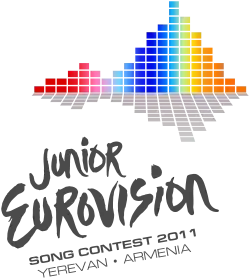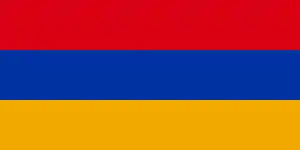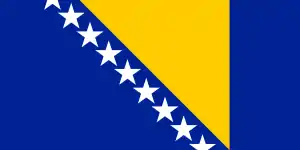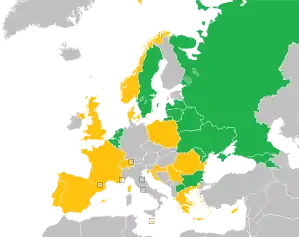Junior Eurovision Song Contest 2011
The Junior Eurovision Song Contest 2011 was the ninth edition of the annual Junior Eurovision Song Contest, and took place in Yerevan, Armenia at the Karen Demirchyan Sports and Concerts Complex.[1] It was the first time in history of the Junior Eurovision Song Contest that the contest was held in the previous year's winning country. Public Television of Armenia ARMTV was the main organizer of the show, being provided financial aid from the European Broadcasting Union made of entrance fees from the participating broadcasters, while Swedish company HD Resources assisted with the technical side of the production.[6]
| Junior Eurovision Song Contest 2011 | |
|---|---|
| Reach for the top! | |
 | |
| Dates | |
| Grand final | 3 December 2011[1] |
| Host | |
| Venue | Karen Demirchyan Sports and Concerts Complex, Yerevan, Armenia |
| Presenter(s) | Gohar Gasparyan Avet Barseghyan[2] |
| Directed by | Daniel Jelinek[3] |
| Executive supervisor | Sietse Bakker[3] |
| Executive producer | Levon Simonyan[4] |
| Host broadcaster | Public Television of Armenia (ARMTV) |
| Opening act | Traditional dance performance |
| Interval act | Molly Sanden performing "Spread a Little Light", Sirusho performing a remixed version of "Qélé, Qélé", Vladimir Arzumanyan |
| Website | junioreurovision |
| Participants | |
| Number of entries | 13 |
| Debuting countries | None |
| Returning countries | |
| Non-returning countries | |
Participation map
| |
| Vote | |
| Voting system | Citizens of each participating country vote by telephone and SMS message, which counts for 50%, while a jury in each country also has a 50% say in the outcome. Each country's 10 favourites are awarded 1 to 8, 10 and 12 points.[5] |
| Nul points | All countries get 12 points from start |
| Winning song | "Candy Music" |
Thirteen countries participated, with Malta and Serbia withdrawing and Bulgaria returning. The winner was the group Candy from Georgia with the song "Candy Music".[7] Netherlands and Belarus finished in second and third place, respectively. This was Georgia's second victory in the Junior Eurovision Song Contest following a previous victory in 2008.
Location

On 18 January 2011, Armenian national broadcaster ARMTV and the European Broadcasting Union (EBU) announced that the 2011 contest would take place in the Karen Demirchyan Sports and Concerts Complex, in Yerevan.[1] The complex consists of two main halls; the Concerts hall and the Sports hall, in addition to the large foyer, Hayastan conference hall and Argishti hall designated for diplomatic meetings, exhibitions and other events.
Format
Logo and graphic design
In May 2011, ARMTV announced a competition for children to design the official logo of the contest, which was due to be presented on 1 June.[8] However, in the end the logo was designed by a professional teams from ARMTV, the EBU and Studio of Anton Baranov from Belarus, who also designed logo of Junior Eurovision Song Contest 2010 and was presented on 15 July 2011.[9] The logo depicts equalizer bars in the shape of a mountain, hinting a toy version of the famous Mount Ararat.[9]
The graphics were made by an Icelandic called Guðmundur Þór Kárason who previously worked on the Icelandic children's show LazyTown and was a photographer for the Eurovision Song Contest 2010.[10] The postcards were produced and directed by him alongside Arthur Vardanyan.
The logo is vibrant, young and playful. The slogan "Reach For The Top" really reflects the ambition of the contestants, and hopefully inspires a young generation of Armenians to do the same.[9]
— Sietse Bakker, Executive Supervisor of the Junior Eurovision Song Contest
Voting rules changes
Changes to the voting included that televoting was possible after all songs had been performed, and not from the beginning of the show as in previous years – returning to the rules active in 2003–2005. Each country's spokesperson also announced all the points during their presentation, due to the lower number of participating countries, as it was done in 2003–2004.[11][12]
Participants
On 15 July, the EBU announced that 12 countries would compete in the upcoming contest. San Marino was to compete for the first time, while Latvia, Serbia and Malta withdrew.[11] EBU also had been negotiating with several other countries, including Italy[13] and Spain, but they were not able to confirm their participation due to the shortage of time.[14] On 15 August, it was announced that Bulgaria had joined the list, returning after a two-year absence from the contest.[15] On 9 September, Latvia reversed its decision to withdraw from the contest and would now send a participant.[16] However, on 7 October it was announced that San Marino would not be present in Armenia as they were not able to find a suitable participant in time for the contest, hoping to send an entry to the 2012 edition.[17] Therefore, a total of 13 countries took part in Armenia.[18]
Together with AMPTV, we are eager to put together the coolest Junior Eurovision Song Contest that Europe has seen so far. The event is extremely popular in Armenia and their strong bid gave us the confidence they will be capable to put together a great show.[1]
— Sietse Bakker, Executive Supervisor of the Junior Eurovision Song Contest
Returning artists
Even though rules of Junior Eurovision do not allow participation of returning artists - EBU issued special permission for Russian entry 2011 performed by participant of Junior Eurovision Song Contest 2009 Ekaterina Ryabova, which is first similar case in history of the contest. According to Sietse Bakker, EBU coordinator - EBU may also drop this rule completely, starting from 2012.[5] Notably, Ekaterina had also already applied to national preselection in 2010 as well, but was disqualified following the existing rule.[19]
Final
Each country gave their votes through a 50% jury and 50% televoting system, which decided their top ten songs using the points 12, 10, 8, 7, 6, 5, 4, 3, 2, and 1.
| Draw | Country | Artist [20] | Song[20] | Language | Place[note 1] | Points |
|---|---|---|---|---|---|---|
| 01 | Katya Ryabova | "Romeo & Juliet" | Russian | 4 | 99 | |
| 02 | Amanda Bašmakova | "Moondog" | Latvian | 13 | 31 | |
| 03 | Lerika | "No, No" | Romanian, English | 6 | 78 | |
| 04 | Dalita | "Welcome to Armenia" | Armenian, English | 5 | 85 | |
| 05 | Ivan Ivanov | "Superhero" | Bulgarian | 8 | 60 | |
| 06 | Paulina Skrabytė | "Debesys" | Lithuanian | 10 | 53 | |
| 07 | Kristall | "Evropa" (Європа) | Ukrainian, English | 11 | 42 | |
| 08 | Dorijan Dlaka | "Žimi ovoj frak" (Жими овој фрак) | Macedonian | 12 | 31 | |
| 09 | Rachel | "Teenager" | Dutch[note 2] | 2 | 103 | |
| 10 | Lidiya Zablotskaya | "Angely dobra" (Ангелы добра) | Russian | 3 | 99 | |
| 11 | Erik Rapp | "Faller" | Swedish | 9 | 57 | |
| 12 | Candy | "Candy Music" | Georgian[note 3] | 1 | 108 | |
| 13 | Femke | "Een kusje meer" | Dutch | 7 | 64 | |
Notes
- Two songs tied for third-highest score with 99 points, and two other tied for lowest score with 31 points, but the official scoreboard ranks Belarus as third, Russia as fourth, Macedonia as twelfth and Latvia as thirteenth placer. This is consistent with the tie-breaking rule that the song that received points from the most countries ranks higher in the case of a tie.
- While the Dutch song is sung in Dutch; however, one phrase is sung in English.
- The Georgian song is in Georgian, however the titular English phrase is sung in the chorus.
Score sheet
| Results | |||||||||||||||||
|---|---|---|---|---|---|---|---|---|---|---|---|---|---|---|---|---|---|
| Russia | 99 | 10 | 10 | 12 | 10 | 8 | 7 | 7 | 12 | 1 | 10 | ||||||
| Latvia | 31 | 2 | 7 | 1 | 8 | 1 | |||||||||||
| Moldova | 78 | 6 | 4 | 6 | 10 | 2 | 7 | 6 | 4 | 8 | 4 | 4 | 5 | ||||
| Armenia | 85 | 8 | 1 | 7 | 5 | 10 | 7 | 5 | 5 | 8 | 10 | 7 | |||||
| Bulgaria | 60 | 2 | 2 | 4 | 1 | 3 | 12 | 3 | 6 | 5 | 6 | 4 | |||||
| Lithuania | 53 | 6 | 6 | 2 | 10 | 4 | 1 | 12 | |||||||||
| Ukraine | 42 | 5 | 1 | 5 | 1 | 1 | 1 | 2 | 2 | 2 | 7 | 3 | |||||
| Macedonia | 31 | 1 | 5 | 2 | 4 | 1 | 3 | 3 | |||||||||
| Netherlands | 103 | 7 | 12 | 10 | 7 | 8 | 6 | 5 | 2 | 10 | 10 | 2 | 12 | ||||
| Belarus | 99 | 12 | 7 | 12 | 8 | 4 | 8 | 12 | 3 | 8 | 3 | 8 | 2 | ||||
| Sweden | 57 | 4 | 8 | 3 | 4 | 3 | 5 | 4 | 6 | 8 | |||||||
| Georgia | 108 | 10 | 3 | 8 | 12 | 6 | 12 | 6 | 5 | 10 | 12 | 6 | 6 | ||||
| Belgium | 64 | 3 | 5 | 3 | 7 | 3 | 2 | 4 | 12 | 1 | 7 | 5 | |||||
| All countries automatically receive 12 points | |||||||||||||||||
12 points
| N. | Contestant | Voting nation |
|---|---|---|
| 3 | Georgia | Armenia, Belarus, Lithuania |
| Belarus | Moldova, Russia, Ukraine | |
| 2 | Russia | Bulgaria, Sweden |
| Netherlands | Belgium, Latvia | |
| 1 | Bulgaria | Macedonia |
| Belgium | Netherlands | |
| Lithuania | Georgia | |
- All countries were given 12 points at the start of voting, therefore no country got nul points. These 12 points were announced by a spokesperson from Australia.
Voting and international broadcasts
The order in which votes were cast during the 2011 contest along with the spokesperson who was responsible for announcing the votes for their respective country. Each national broadcaster also sent a commentator to the contest, in order to provide coverage of the contest in their own native language. Details of the commentators and the broadcasting station for which they represented are also included in the table below.
Spokespersons
 Russia – Valentin Sadiki
Russia – Valentin Sadiki Latvia – Šarlote Lēnmane (Latvian representative at the Junior Eurovision Song Contest 2010)
Latvia – Šarlote Lēnmane (Latvian representative at the Junior Eurovision Song Contest 2010) Moldova – Ștefănel Roșcovan (Moldovan representative at the Junior Eurovision Song Contest 2010)
Moldova – Ștefănel Roșcovan (Moldovan representative at the Junior Eurovision Song Contest 2010) Armenia – Razmik Arghajanyan
Armenia – Razmik Arghajanyan Bulgaria – Samuil Sarandev-Sancho
Bulgaria – Samuil Sarandev-Sancho Lithuania – Dominykas Žvirblis
Lithuania – Dominykas Žvirblis Ukraine – Amanda Koenig
Ukraine – Amanda Koenig Macedonia – Anja Veterova (Macedonian representative at the Junior Eurovision Song Contest 2010)
Macedonia – Anja Veterova (Macedonian representative at the Junior Eurovision Song Contest 2010) Netherlands – Anna Lagerweij (Dutch representative at the Junior Eurovision Song Contest 2010 as part of the duo Anna and Senna)
Netherlands – Anna Lagerweij (Dutch representative at the Junior Eurovision Song Contest 2010 as part of the duo Anna and Senna).svg.png.webp) Belarus – Anna Kovalyova
Belarus – Anna Kovalyova Sweden – Ina-Jane von Herff
Sweden – Ina-Jane von Herff Georgia – Elene Makashvili (Georgian representative at the Junior Eurovision Song Contest 2009 as part of the Group Princesses)
Georgia – Elene Makashvili (Georgian representative at the Junior Eurovision Song Contest 2009 as part of the Group Princesses).svg.png.webp) Belgium – Jill & Lauren (Belgian representatives at the Junior Eurovision Song Contest 2010)
Belgium – Jill & Lauren (Belgian representatives at the Junior Eurovision Song Contest 2010)
Participating countries
 Armenia – Artak Vardanyan and Marianna Javakhyan (Armenia 1)
Armenia – Artak Vardanyan and Marianna Javakhyan (Armenia 1).svg.png.webp) Belarus – Denis Kuryan (Belarus 1)
Belarus – Denis Kuryan (Belarus 1).svg.png.webp) Belgium – Kristien Maes and Tom De Cock (Eén)
Belgium – Kristien Maes and Tom De Cock (Eén) Bulgaria – Elena Rosberg and Georgi Kushvaliev (BNT 1)
Bulgaria – Elena Rosberg and Georgi Kushvaliev (BNT 1) Georgia – Temo Kvirkvelia (GPB)
Georgia – Temo Kvirkvelia (GPB) Latvia – Markus Riva (LTV)
Latvia – Markus Riva (LTV) Lithuania – Darius Užkuraitis (LRT)
Lithuania – Darius Užkuraitis (LRT) Macedonia – Elizabeta Cebova (MRT 1)
Macedonia – Elizabeta Cebova (MRT 1) Moldova – Rusalina Rusu (TRM)
Moldova – Rusalina Rusu (TRM) Netherlands – Marcel Kuijer (Nederland 3)
Netherlands – Marcel Kuijer (Nederland 3) Russia – Olga Shelest (Russia-1)
Russia – Olga Shelest (Russia-1) Sweden – Edward af Sillen and Ylva Hällen (SVT B)
Sweden – Edward af Sillen and Ylva Hällen (SVT B) Ukraine – Timur Miroshnychenko[21] (NTU)
Ukraine – Timur Miroshnychenko[21] (NTU)
Non-participating countries
.svg.png.webp) Australia – Australia broadcast the Junior Eurovision Song Contest 2011 on SBS One on 26 December 2011. Australia also gave every country 12 points to start with.[22] The show was broadcast again on 9 April 2012.
Australia – Australia broadcast the Junior Eurovision Song Contest 2011 on SBS One on 26 December 2011. Australia also gave every country 12 points to start with.[22] The show was broadcast again on 9 April 2012. Bosnia and Herzegovina – Bosnia and Herzegovina used a delayed broadcast for the Junior Eurovision Song Contest 2011 on BHRT.[23]
Bosnia and Herzegovina – Bosnia and Herzegovina used a delayed broadcast for the Junior Eurovision Song Contest 2011 on BHRT.[23]
Official album
| Junior Eurovision Song Contest Yerevan 2011 | ||||
|---|---|---|---|---|
 | ||||
| Compilation album by | ||||
| Released | 25 November 2011 | |||
| Genre | Pop | |||
| Label | Universal | |||
| Junior Eurovision Song Contest chronology | ||||
| ||||
Junior Eurovision Song Contest Yerevan 2011, is a compilation album put together by the European Broadcasting Union, and was released by Universal Music Group on 25 November 2011. The album features all the songs from the 2011 contest, along with karaoke versions.[24]
References
- Siim, Jarmo (18 January 2011). "Armenia to host Junior Eurovision in 2011". European Broadcasting Union.
- "Yerevan: Gohar and Avet to host". Junioreurovision.tv. 15 November 2011. Retrieved 15 November 2011.
- "Full Cast and Credits". Junior Eurovision Song Contest 2011. IMDB. Retrieved 13 December 2012.
- "EBU 'confident' in Junior Eurovision future". Junioreurovision.tv. 30 November 2011. Retrieved 13 February 2017.
- "JESC info". ESCKaz.
- "Eurovision Song Contest - Armenia". ARMTV. Retrieved 25 January 2011.
- "CANDY from Georgia win Junior 2011!". junioreurovision.tv. December 3, 2011.
- "ARMTV launch 2011 logo competition". Oikotimes. May 22, 2011. Archived from the original on September 5, 2012. Retrieved October 14, 2011.
- "JESC 2011 logo: Reach for the top!". Oikotimes. July 16, 2011. Retrieved October 14, 2011.
- https://www.nrk.no/mgp/esc-artistene-2010-1.6953605
- Siim, Jarmo (2011-07-15). "12 countries for Junior Eurovision 2011, several changes coming up". European Broadcasting Union. Retrieved 15 July 2011.
- "EBU has released list of participants of the Junior Eurovision Contest 2011".
- "Italy in Junior Eurovision 2011?". Oikotimes. July 2, 2011. Archived from the original on July 4, 2011. Retrieved October 14, 2011.
- "JESC 2011 with 12 countries, San Marino in!". Oikotimes. July 16, 2011. Archived from the original on September 5, 2012. Retrieved October 14, 2011.
- "Confirmed: Bulgaria in JESC 2011". Oikotimes. August 16, 2011. Archived from the original on February 10, 2012. Retrieved October 14, 2011.
- Siim, Jarmo (2011-09-09). "Latvia becomes 14th country to join Junior 2011". European Broadcasting Union. Retrieved 9 September 2011.
- "CONFIRMED: SAN MARINO OUT OF JESC 2011". Oikotimes. 2011-10-07. Archived from the original on 2012-09-05. Retrieved 7 October 2011.
- "It's here: final running order of Junior 2011!". European Broadcasting Union. October 11, 2011. Retrieved October 14, 2011.
- "The situation with participation of Katya Ryabova in the national preselection..."
- "Junior Eurovision Song Contest - Yerevan 2011". junioreurovision.tv. Retrieved October 14, 2011.
- ДПКЄ-2011: церемонія відкриття. National Television Company of Ukraine (in Ukrainian). 3 December 2011. Retrieved 20 May 2013.
- "SBSONE TV Guide".
- Granger, Anthony (3 December 2011). "Where can I watch JESC 2011?". eurovoix.com. Retrieved 26 June 2017.
- "Junior Eurovision Song Contest 2011". itunes.apple.com. 23 November 2015. Retrieved 23 November 2015.
External links
| Wikimedia Commons has media related to Junior Eurovision Song Contest 2011. |
